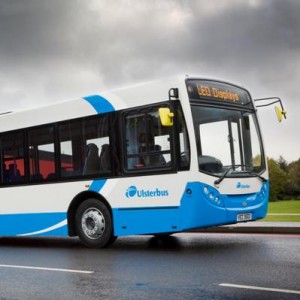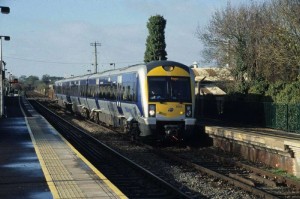The big debate: Public transport – we’re stuck in a vicious cycle…
 As society is becoming more environmentally conscious, the issue of public transport must be raised. Transport is one of the biggest sources of climate changing gases. As we all know, using buses and trains is far more energy efficient than private cars. Northern Ireland appears to be lagging behind when it comes to public transport use and funding.
As society is becoming more environmentally conscious, the issue of public transport must be raised. Transport is one of the biggest sources of climate changing gases. As we all know, using buses and trains is far more energy efficient than private cars. Northern Ireland appears to be lagging behind when it comes to public transport use and funding.
Translink’s corporate plan for the next three years, submitted to the Northern Ireland Assembly Committee for Regional Development revealed that the company would lose £23 million if service levels are kept as they are. Government funding for 2013/2014 will also be reduced to £25.4 million. The Department for Regional Development (DRD) said the deficit is due to a number of factors such as increasing fuel costs, a reduction in school transport income because of falling pupil numbers and the rising cost of concessionary fares.
A direct consequence of these issues is the increase in some public transport fares, which came into effect on Monday 30th April. On average, fares have increased by 3%, except a number of Metro multi-journey tickets and discounted fares after 9.30pm. Translink’s Marketing Executive Ciaran Rogan said, “We know this is unwelcome news, but we are confident that bus and train travel is still the most attractive and cost effective travel choice, particularly given the soaring fuel prices, with Northern Ireland among the highest in Europe.”
The statistics say otherwise. Despite the rising costs of fuel and environmental concerns over carbon emissions, Northern Ireland remains a car-dependent society. A government report – Public Perceptions of Car Emissions – published in 2009 highlighted that travelling by car or van was the most popular choice for Northern Ireland residents. Just under half of those surveyed (45%), believed that reducing car use for the sake of the environment was pointless, since not enough people would take part to make it work.
 There has been no significant shift towards public transport in the following years. Rail passenger journeys increased by 4%, from 2009-10 to 2010-11, while passenger journeys on Ulsterbus fell by 3%. The DRD’s Business Plan for 2012-2013 states that, “Current transport arrangements, and the high levels of dependency on the private car, particularly in urban areas, are not sustainable.”
There has been no significant shift towards public transport in the following years. Rail passenger journeys increased by 4%, from 2009-10 to 2010-11, while passenger journeys on Ulsterbus fell by 3%. The DRD’s Business Plan for 2012-2013 states that, “Current transport arrangements, and the high levels of dependency on the private car, particularly in urban areas, are not sustainable.”
Promoting sustainable travel and transport and encouraging a shift from the private car is cited as one of the annual objectives for 2012-13. Yet according to the Plan, around 72% of spending and investment is going towards roads, with only around 28% going into transport. Declan Allison, a campaigner from environmental organisation Friends of the Earth NI said, “Road building encourages travel by car, undermines public transport and will lead to increased carbon emissions.”
He suggested that reversing the balance of spending, so that public transport, walking and cycling get a larger proportion of the resources would be a way to solve the problem. Under-funding of the public transport system is certainly a major issue. It reflects the position that public transport holds on the priority scale, not only for the government, but for ordinary people. It is debatable whether more money would make a real difference in the long term to public transport use. It is the social attitudes and the general infrastructure of Northern Ireland that need to be addressed first.
 A car is considered as a necessity, not a luxury. Public transport tends to be seen as second rate, for those who cannot afford to drive, or are too young to do so. This is partly because the economy and infrastructure are largely geared towards car users. Mr Allison continued, “The planning system assumes people will prefer to drive and indeed encourages people to drive by allowing a pattern of scattered development. Private car use has led to urban sprawl and the suburbanisation of the countryside. This scattered pattern of development locks people into car use as work, shops, services, and social activities are far from people’s homes.”
A car is considered as a necessity, not a luxury. Public transport tends to be seen as second rate, for those who cannot afford to drive, or are too young to do so. This is partly because the economy and infrastructure are largely geared towards car users. Mr Allison continued, “The planning system assumes people will prefer to drive and indeed encourages people to drive by allowing a pattern of scattered development. Private car use has led to urban sprawl and the suburbanisation of the countryside. This scattered pattern of development locks people into car use as work, shops, services, and social activities are far from people’s homes.”
The erratic timetables outside of the bigger cities, especially in winter time and in the evenings, also contribute to the preference for cars. The fare increases are unlikely to help the situation. It can often be more convenient, and not much more expensive, to drive short distances rather than use public transport. It seems that a vicious cycle has been created. The majority favour driving, so public transport companies lose money and infrastructure planning is done with the car user in mind.
This in turn makes many people reluctant to use public transport, which makes it a lower priority when it comes to funding. Companies like Translink are then forced to increase their fares, possibly losing more customers along the way.
This cycle must be broken, if public transport is to thrive in Northern Ireland.
Short URL: https://newrytimes.com/?p=13796













